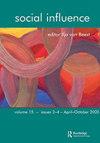自主支持和抗拒支持接种都增强了对宣传的抵抗力,作为国家自治而不是国家抗拒的中介
IF 0.6
3区 心理学
Q3 PSYCHOLOGY, SOCIAL
引用次数: 2
摘要
本文对两种反宣传策略进行了测试,以增强人们对极端主义宣传的抵抗力,一种是基于自我决定理论,另一种是基于心理抗拒理论。高加索裔土耳其工人参与者(N = 387)被告知他们将阅读极端主义信息,并被随机分配到中立控制条件、自主支持接种条件(“你可以选择同意或不同意”)或反抗支持接种条件(“不要让他们操纵你”)。然后,他们阅读并评价自己对两个反移民极端主义信息的认同。与对照组相比,两种接种方式对极端信息的认同程度都较低。这些影响与参与者的政治保守主义和特质抗拒无关,尽管这些个人变量都与信息一致性有关。自主性-支持效应和抗拒-支持效应均受感觉自主性需求满足的调节,而不受状态抗拒的调节。具有讽刺意味的是,告诉参与者他们可以自由地接受极端主义的说法,可能会帮助他们抵制这种说法。本文章由计算机程序翻译,如有差异,请以英文原文为准。
Autonomy supportive and reactance supportive inoculations both boost resistance to propaganda, as mediated by state autonomy but not state reactance
ABSTRACT We tested two counter-propaganda strategies for boosting peoples’ resistance to extremist propaganda, one based on Self-Determination Theory and one based on Psychological Reactance theory. Caucasian mTurk worker participants (N = 387) were told they would read extremist messages and were randomly assigned to either a neutral control condition, an autonomy-supportive inoculation condition (‘it is your choice to agree or not’), or a reactance-supportive inoculation condition (‘don’t let them manipulate you’). They then read and rated their agreement with two anti-immigrant extremist messages. Both inoculations produced lower agreement with the extremist messages, compared to the control condition. These effects were independent of participants’ political conservatism and trait reactance, although these person variables were both associated with message agreement. Both the autonomy-support and reactance-support effects were mediated by felt autonomy need-satisfaction, but not by state reactance. Ironically, telling participants that they are free to accept extremist claims may help them to resist such claims.
求助全文
通过发布文献求助,成功后即可免费获取论文全文。
去求助
来源期刊

Social Influence
PSYCHOLOGY, SOCIAL-
CiteScore
1.50
自引率
0.00%
发文量
4
期刊介绍:
Social Influence is a journal that provides an integrated focus for research into this important, dynamic, and multi-disciplinary field. Topics covered include: conformity, norms, social influence tactics such as norm of reciprocity, authority, scarcity, interpersonal influence, persuasion, power, advertising, mass media effects, political persuasion, propaganda, comparative influence, compliance, minority influence, influence in groups, cultic influence, social movements, social contagions, rumors, resistance to influence, influence across cultures, and the history of influence research.
 求助内容:
求助内容: 应助结果提醒方式:
应助结果提醒方式:


